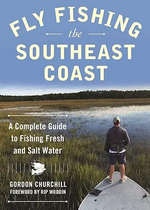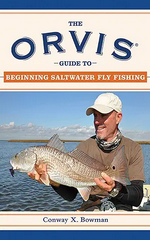The cost of top of the line rods is staggering. It is possible to spend over $1,100 on the top of the line G. Loomis (the Asquith) and the top rods from Orvis, Sage, Thomas & Thomas, R.L. Winston, Scott and Hardy are in the $800 to $1,000 range. And they are not custom rods with exotic butt wraps and special one-of-a-kind reel seats. Why do they cost so much?
There are several main reasons:
1. The top of the line rod companies spend a lot of money on research striving to find the best designs for a variety of rods designed for everything from small trout streams to giant oceans. Since they will not sell zillions of their expensive rods, the cost per rod for the research is relatively high. Often the lower end rods employ yesterday’s technology at a reduced price or even the new technology but with less expensive components. And some rod companies owned by the same corporation benefit from the higher end company’s research. But the cost of new research is high.
2. Top of the line rods have high quality components- cork handles, beautiful reel seats and very sturdy line guides and tip tops. You can count on the high-end rods to have had the spine or spline of the blanks identified and the line guides placed correctly in relation to the spine or spline. The wraps and glues used are flawless.
3. Many rod companies offer a lifetime warranty on their product with varying degrees of repair costs. Ordinarily, clear failures of the product will be very inexpensive, perhaps even free shipment to and from the factory. Others charge for this service, again based in part upon the cause of the problem. User abuse is more expensive to repair than equipment failure. Some club members have rods they have had for many years that have been repaired several times. The warranty work is expensive for the company so some of the cost of the fancy rod covers damage it may get over 20-30 years. Note that Orvis has only a 25 year warranty, which might as well be lifetime for some of us old geezers. If I bought a new Orvis today, I would be 99 before the warranty wore out and I fear my warranty would have worn out before that. Oh well. Just go down casting!
4. Many rod companies have guides and noted fly anglers serve on their pro-team of advisors, giving them feedback on new products or products in development. The result is often higher quality rods because they have been used and tested by folks who actually fish with them. Having a lot of Pro-Staff members can be expensive.
5. Having said this, before he died Lefty Kreh said on numerous occasions that virtually any rod that costs more than $250 will be better that 90% of the anglers who use them. So, the really expensive rods are a fashion statement of sorts. Some anglers are more interested in having the latest model than with having a rod adequate for their fishing.
6. In recent years, high end manufacturers have focused on Very Fast and even Ultra Fast action rods that only genuine experts can cast with any degree of satisfaction. It’s nice to have some good eye-candy but in terms of casting enjoyment, most of us will be happy with rods costing 50-75% less. They tend to come in Moderate to Moderate-Fast, even Fast actions. They will do just fine. It has been said that a fancy rod will not make a bad caster great but will make an excellent caster even better. We rejoice in the advances being made in rod design for they will trickle down to the less expensive rods in short order. Of particular interest in the dampening qualities in some of the new rods. Instead of bouncing up-down-and all around after unbending and flinging the fly line, they dampen down very quickly, avoiding a lot of interference to the fly line in flight. This technology shows great promise. Another source of good rods is the used rod market where you can find top rods from 5-10 years ago that are very usable by good casters. There is a cult following for some of the original Orvis Helios rods, now into their third generation and the Orvis Hydros is a real find if you can get one. It is the original Helios blank with less expensive line guides, reel seats and cork. Some G. Loomis models from yore are legendary. But if you decide to get one of the cutting-edge rods, please bring it around to show off and let some of us try casting it a time or two. New and improved may actually be more than just new now and then. The point is, many of us have all the rods we have room to store and we don’t need to be tempted- but then temptation can be fun. So bring them on!
7. Fly fishing has the reputation of being an expensive sport. And it can be. But it doesn’t need to be. It need be no more expensive than you want it to be. In fact, some of the better fly anglers in our club use very modest equipment. But they use it well. They have been fishing with it for years- decades even- and it has become an extension of their body. They know how to use it because they have been using it for years and their comfort level is high. The truth is, confidence is one of the most important qualities in being a successful angler. If you use equipment that you trust, that translates into angling success. This applies to rods, reels and line. It also applies to flies. Go to any decent fly shop or look in any decent fly fishing catalog and you will see a seemingly endless array of flies. But the best flies are the ones you have learned how to use to catch fish. You know how to make it move correctly to entice fish to eat it. You have discovered the best leader and tippet combination to make it work by trial and error. It’s like having a conversation with an old friend or cooking a favorite dish with that special pot or pan or even drinking coffee from your favorite mug. This is when fly fishing becomes such an enjoyable sport. But it takes time and practice to get there to that level of comfort and satisfaction.
8. OK, I’ve quite preachin’ and gone to meddlin’ perhaps. But one story. I remember perhaps the most pivotal moment in my fly fishing career. Several of us had taken our boats up to a lake near Chapel Hill. A good friend and I were fishing in my boat and two of the best casters in the club were in another. Both boats were fishing a huge line of lily pads. They started at one end and we started at the other. My friend and I were flailing away- having fun but still flailing away. As the two boats got closer, I happened to look up as the two excellent casters were working the pads like pros. I just held my rod and watched. I noticed how easy they were making their casts- no grunting and groaning or tearing up the water. They were catching fish now and then. That’s when I realized I was trying too hard to make my casts work. It wasn’t that I didn’t have the right rod or line or fly. It was me- trying too hard. From that moment on, I have worked on trusting my equipment to do a good job. Instead of trying to make my rod and line work, I have been focusing on letting my equipment do their job. That was the day I came up with my favorite line about fly fishing: The hardest thing about fly fishing for me is remembering how easy it is! So, watch the good casters and notice how easy they make it look. They are trusting their equipment to work well. That’s the point of our practice, these papers, our programs, our casting clinics and various activities. Perhaps we have to go through that stage of trying to make it work. But enjoyment begins when we decide to quit trying so hard and let it work. What matters most is our attitude and approach. So, let it happen instead of trying to make it happen! That’s when you realize your rod, reel and line are better than you thought they were.
Don’t forget to check out the resources of Fly Fishers International at www.flyfishersinternational.org.
Also, Google this and other topics of interest and go to YouTube for seemingly endless videos.
Comment from Dean Gayther: Older rods aren’t necessarily better fishing rods. Tested two “very old” rods against a newer, but still 10 yr. old, Guide Series rod from Gander. Improvements in rod material gives greater feel for strikes and casting control. Investing time and money in old antique rods may not pay off on the water. Interested in what others experience has been.



